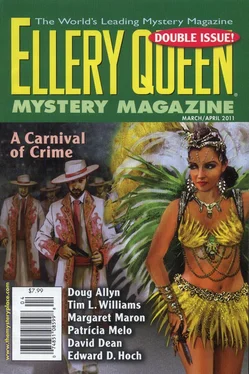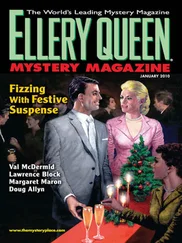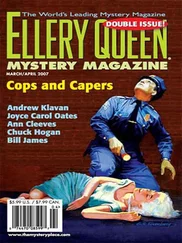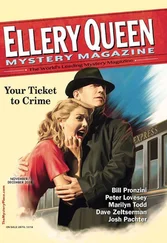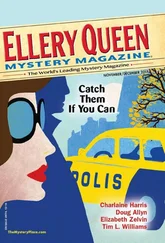Doug Allyn - Ellery Queen’s Mystery Magazine. Vol. 137, No. 3 & 4. Whole No. 835 & 836, March/April 2011
Здесь есть возможность читать онлайн «Doug Allyn - Ellery Queen’s Mystery Magazine. Vol. 137, No. 3 & 4. Whole No. 835 & 836, March/April 2011» весь текст электронной книги совершенно бесплатно (целиком полную версию без сокращений). В некоторых случаях можно слушать аудио, скачать через торрент в формате fb2 и присутствует краткое содержание. Город: New York, Год выпуска: 2011, ISBN: 2011, Издательство: Dell Magazines, Жанр: Детектив, на английском языке. Описание произведения, (предисловие) а так же отзывы посетителей доступны на портале библиотеки ЛибКат.
- Название:Ellery Queen’s Mystery Magazine. Vol. 137, No. 3 & 4. Whole No. 835 & 836, March/April 2011
- Автор:
- Издательство:Dell Magazines
- Жанр:
- Год:2011
- Город:New York
- ISBN:ISSN 0013-6328
- Рейтинг книги:5 / 5. Голосов: 1
-
Избранное:Добавить в избранное
- Отзывы:
-
Ваша оценка:
- 100
- 1
- 2
- 3
- 4
- 5
Ellery Queen’s Mystery Magazine. Vol. 137, No. 3 & 4. Whole No. 835 & 836, March/April 2011: краткое содержание, описание и аннотация
Предлагаем к чтению аннотацию, описание, краткое содержание или предисловие (зависит от того, что написал сам автор книги «Ellery Queen’s Mystery Magazine. Vol. 137, No. 3 & 4. Whole No. 835 & 836, March/April 2011»). Если вы не нашли необходимую информацию о книге — напишите в комментариях, мы постараемся отыскать её.
Ellery Queen’s Mystery Magazine. Vol. 137, No. 3 & 4. Whole No. 835 & 836, March/April 2011 — читать онлайн бесплатно полную книгу (весь текст) целиком
Ниже представлен текст книги, разбитый по страницам. Система сохранения места последней прочитанной страницы, позволяет с удобством читать онлайн бесплатно книгу «Ellery Queen’s Mystery Magazine. Vol. 137, No. 3 & 4. Whole No. 835 & 836, March/April 2011», без необходимости каждый раз заново искать на чём Вы остановились. Поставьте закладку, и сможете в любой момент перейти на страницу, на которой закончили чтение.
Интервал:
Закладка:
Then again, what did I have to hide?
I opened the door to let them in.
Denise and McKenna did not drown.
They died on solid ground.
They had just reached the north end of the bridge heading south when the main span gave way, leaving the span they were on with nothing to hold up its south end. That end fell, but the north end held, creating a sudden, sharp incline toward the ground.
Not a long incline, maybe fifty feet, but nearly vertical.
The medical examiner determined that they had survived the initial fall — the steep slide down.
What killed them had come after.
From above.
An SUV.
A semi.
Other vehicles.
Other people.
It wasn’t until I let the detectives in that I first took a good hard look at where I was living. Took the time to see what others saw.
The outside was three stories of bricks, tall arched windows, and a front stoop. Part of a new building fronted to look like old rowhouses. Rowhouses that had never been a part of the area. Never a part of the true history of the milling district and its skid-row environs of railroad yards, bars, and flophouses. The rowhouses creating the facade of a mythical time. A mythical place.
But while the outside was designed to look old, the inside reflected the new.
Modern.
Spare.
So spare that it seemed lifeless. One big open room of concrete and ventilation pipes. It was supposed to look like a loft or converted warehouse, but instead it just looked cold. A hollow imitation.
The kitchen was open, exposed, marked off by a granite-topped, elongated island and filled with large swatches of stainless steel that covered the refrigerator, dishwasher, and stove. In what passed for the living room, a large television filled one wall opposite a dark green sofa. A green wing chair sat ninety degrees to the sofa and faced the front, curtainless windows.
The only items out of place with the modern interior were the vestiges of my old life. A Schwinn mountain bike leaning against the wall near the front door. A pair of oak bookcases filled with hardcovers, spines exposed, some standing, some on their sides. The tired green couch and wing chair. A forties-era Baldwin spinet piano. And a tan, square coffee table stained with dark brown water marks and the rainbow spectrum of McKenna’s crayon ticks that had run beyond the edges of the paper. The table that had been her favorite place to color.
I’d bought the rowhouse before I’d even collected the insurance money. We’d lived in the safety of the suburbs in an Arts and Crafts bungalow.
The perfect home for a family.
The worst place to live after your family has died.
I sold it so fast I hardly remember the closing.
Or moving out.
Or moving in.
The subconscious has a way of blocking those things out.
I’m a professor at the university. Was. Am still, I guess. Music Department. The dean of the department was kind enough to approve a sabbatical after the bridge collapse. It was his idea. The students needed a teacher. I’d stopped coming in.
After Denise and McKenna died, there didn’t seem much point to music anymore.
During that first visit, Phelps settled on the front edge of the wing chair. I sat on the couch. We had to turn our heads to look at each other. We each faced a side of the coffee table, little more now than a receptacle for my debris: a dozen empty bottles of Summit beer, a glass, emerald-green ashtray stuffed with a bloom of short, bent Winstons, and, open but facedown, a book of poems by W. H. Auden. The marks on the table from McKenna’s crayons looked like fading confetti amid the debris.
Lewis stayed on his feet, perusing the few details of my life that were on display. He shuffled past the bookcases, the bloodless kitchen, and the urban view out my front window. But he stopped at the photographs on top of the walnut-colored piano, my shrine to Denise and McKenna: half a dozen photographs in frames amid McKenna’s drawings and Denise’s handmade pottery. Who they were and what they were.
To me.
Phelps rested his elbows on his thighs. His folded hands hung down into the empty space between his knees.
“We appreciate your help in this matter. And nothing sounds crazy to me, Mr. Enright. I’ve been on the force long enough to know that anything that might help us solve a crime is worth checking out.”
My mouth opened as I began to understand. “Was the body there? Where I said it would be?”
The detective pushed his lips together and nodded.
It was in that nod that my life changed. What I’d seen in my mind had not been a dream or an illusion. It had been a view of reality. A reality beyond my own.
More than a memory of a dream.
More a dream of someone else’s memory.
Icarus.
That’s what they are calling him now. I saw it in a headline in the newspaper after the third death. The media always need a catchy name for everything murderous. The Green River Killer. Jack the Ripper. The Boston Strangler. Son of Sam. They need the name and the fancy graphic, the Pavlovian trademarks they flash on the screen to draw in viewers to the latest gruesome details.
Now it’s Icarus.
I named him.
I’ve been reading Auden lately and came across his poem “Musée des Beaux Arts.” In it he considers the cold-hearted indifference of daily life to the tragedy befalling others all around us. And it struck deep into my heart. It was all I’d been feeling since the bridge collapsed. Since my life collapsed onto the muddy banks and into the muddy waters of the Mississippi.
Daedalus, the story goes, had constructed wings of feathers attached with wax for himself and his son, Icarus, so they could escape imprisonment. Daedalus had warned Icarus not to fly too close to the sun, but, caught up in the glory of his own good fortune, Icarus ignored his father’s advice. The wax melted, the feathers came off, and Icarus plunged into the sea.
Auden considered the indifference of those who might have seen the fall of Icarus, an indifference I see every day of my life:
... how everything turns away
Quite leisurely from the disaster; the ploughman may
Have heard the splash, the forsaken cry,
But for him it was not an important failure; the sun shone
As it had to on the white legs disappearing into the green
Water; and the expensive delicate ship that must have seen
Something amazing, a boy falling out of the sky,
Had somewhere to get to and sailed calmly on.
I’d mentioned this to Detective Phelps in a vain attempt to explain the indifference to my tragedy that emanates from the world around me. The indifference that infuriates me. The indifference that makes me want to shake them. To shout at them. To show them my hell.
But I guess he only took away the image of Icarus falling.
So now the killer is Icarus.
And once again the cops and the media have gotten it wrong.
Icarus the mythological character falls.
Icarus the murderer does not.
In that first meeting, after Phelps had confirmed what I had seen — confirmed my psychic ability — I began to feel sick. My head dropped between my knees.
Phelps quickly kneeled by my side. With a gentle push, he helped me sit upright again. “Take some deep breaths.”
I did as I was told, swallowing down slow waves of bile as they rose in my throat. After I assured him I was better, Phelps returned to his chair.
He pulled a notepad and pen out of his inside coat pocket, flipped the notepad open, and clicked the pen. “You told the dispatcher that you saw the man in a dream, is that correct?”
“Well, it wasn’t exactly a dream. I was awake. I’d just woken up and this image popped into my head of a man in a Twins jersey facedown on the rocks.”
Читать дальшеИнтервал:
Закладка:
Похожие книги на «Ellery Queen’s Mystery Magazine. Vol. 137, No. 3 & 4. Whole No. 835 & 836, March/April 2011»
Представляем Вашему вниманию похожие книги на «Ellery Queen’s Mystery Magazine. Vol. 137, No. 3 & 4. Whole No. 835 & 836, March/April 2011» списком для выбора. Мы отобрали схожую по названию и смыслу литературу в надежде предоставить читателям больше вариантов отыскать новые, интересные, ещё непрочитанные произведения.
Обсуждение, отзывы о книге «Ellery Queen’s Mystery Magazine. Vol. 137, No. 3 & 4. Whole No. 835 & 836, March/April 2011» и просто собственные мнения читателей. Оставьте ваши комментарии, напишите, что Вы думаете о произведении, его смысле или главных героях. Укажите что конкретно понравилось, а что нет, и почему Вы так считаете.
